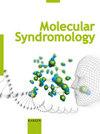Report of a Novel Homozygous Intragenic DCC Duplication and a Review of Literature of Developmental Split-Brain Syndrome aka Horizontal Gaze Palsy with Progressive Scoliosis-2 with Impaired Intellectual Development Syndrome
IF 0.9
4区 医学
Q4 GENETICS & HEREDITY
引用次数: 0
Abstract
Introduction: Horizontal gaze palsy with progressive scoliosis-2 (HGPPS2, MIM 617542) with impaired intellectual development aka developmental split-brain syndrome is an ultra-rare congenital disorder caused by pathogenic biallelic variants in the deleted in colorectal cancer (DCC) gene. Case Presentation: We report the clinical and genetic characterization of a Syrian patient with a HGPPS2 phenotype and review the previously published cases of HGPPS2. The genetic screening was performed using exome sequencing on Illumina platform. Genetic analysis revealed a novel DCC c.(?_1912)_(2359_?)dup, p.(Ser788Tyrfs*4) variant segregating recessively in the family. This type of variant has not been described previously in the HGPPS2 patients. To date, including the case reported here, three different homozygous pathogenic frameshift variants, one homozygous missense variant, and an intragenic duplication in the DCC gene have been reported in 8 patients with the HGPPS2 syndrome. Conclusion: The analysis of duplications and deletions in the DCC should be included in the routine genetic diagnostic evaluation of patients with suspected HGPPS2. This report expands the knowledge of phenotypic and genotypic spectrum of pathogenic variants causing HGPPS2.新型同基因内DCC重复的报告以及发育性裂脑综合征又称水平凝视麻痹伴进行性脊柱侧凸-2智力发育障碍综合征的文献综述
水平凝视性麻痹伴进行性脊柱侧凸-2 (HGPPS2, MIM 617542),智力发育受损,又称发育性裂脑综合征,是一种由结肠直肠癌(DCC)缺失基因致病性双等位基因变异引起的超罕见先天性疾病。病例介绍:我们报告了一名叙利亚HGPPS2表型患者的临床和遗传特征,并回顾了先前发表的HGPPS2病例。基因筛选采用Illumina平台外显子组测序。遗传分析显示,该家族中存在一种新的DCC c.(?_1912)_(2359_?)dup, p.(Ser788Tyrfs*4)变异隐性分离。这种类型的变异以前未在HGPPS2患者中被描述过。迄今为止,包括本文报道的病例在内,在8例HGPPS2综合征患者中报道了三种不同的纯合致病性移码变异,一种纯合错义变异和DCC基因的基因内重复。结论:DCC重复和缺失分析应纳入疑似HGPPS2患者的常规遗传诊断评估。本报告扩大了对HGPPS2致病变异的表型和基因型谱的认识。
本文章由计算机程序翻译,如有差异,请以英文原文为准。
求助全文
约1分钟内获得全文
求助全文
来源期刊

Molecular Syndromology
Biochemistry, Genetics and Molecular Biology-Genetics
CiteScore
1.70
自引率
9.10%
发文量
67
期刊介绍:
''Molecular Syndromology'' publishes high-quality research articles, short reports and reviews on common and rare genetic syndromes, aiming to increase clinical understanding through molecular insights. Topics of particular interest are the molecular basis of genetic syndromes, genotype-phenotype correlation, natural history, strategies in disease management and novel therapeutic approaches based on molecular findings. Research on model systems is also welcome, especially when it is obviously relevant to human genetics. With high-quality reviews on current topics the journal aims to facilitate translation of research findings to a clinical setting while also stimulating further research on clinically relevant questions. The journal targets not only medical geneticists and basic biomedical researchers, but also clinicians dealing with genetic syndromes. With four Associate Editors from three continents and a broad international Editorial Board the journal welcomes submissions covering the latest research from around the world.
 求助内容:
求助内容: 应助结果提醒方式:
应助结果提醒方式:


